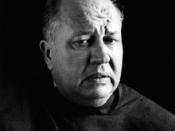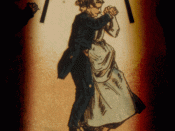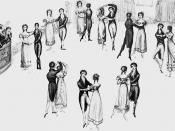The definition of the word "waltz" in the Webster's Dictionary denotes it to being a "a ballroom dance, in moderately fast triple meter, in which the dancers revolve in perpetual circles, taking one step to each beat." With this denotation or dictionary meaning of the word, the reader instinctively assumes that Theodore Roethke's poem solely focuses on a father's dance with his son. However, as we have seen, connotations provide the reader with overtones of meanings that go beyond what it expresses. The rhythm of this poem is, for the most part, that of iambic trimeter with stresses at the end of lines such as "dizzy" (line 4) and "easy" (line 2) and "pans" (line 5) and "countenance" (line7) make the reader sway to back and forth with - similar to that of a waltz. Rhythm and rhyme are used throughout the poem provides a subtle beat which enables the reader to believe he is dancing.
The poet communicates the connotation of the title by manipulating our emotional response to the poem through a number of literary conventions, some of which play on the conventions of a waltz. The word choice indicates that this poem is far from a friendly dance but a more sinister aspect of this waltz which unveils an unsettling emotion under the surface of this poem. Imagery is used by the speaker to contrast fear-provoking images with reassuring ones. The connotative meanings of the title are apparent through these devices.
The reader may presume that the speaker in "My Papa's Waltz" is a child or a man reminiscing about his youth through the simple level of vocabulary used. "Could not unfrown itself", unfrown is a fabricated term nonexistent in the English language, thus it is clear that the speaker's lexicon is far from sophisticated...


